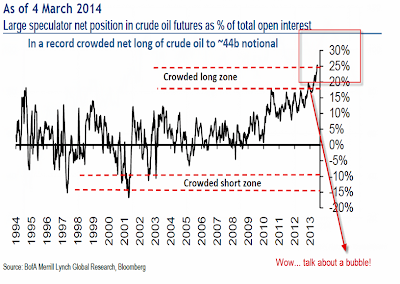Mish's Global Economic Trend Analysis |
- Facebook CEO Calls Obama Regarding Out of Control NSA; Change You Can't Believe In
- Crude Headed to $80s? Massive Speculative Positions vs. It's the Economy Stupid
- Democrat Sponsored "Income Inequality"; Law of Bad Ideas, Yet Again
| Facebook CEO Calls Obama Regarding Out of Control NSA; Change You Can't Believe In Posted: 13 Mar 2014 10:49 PM PDT President Obama promised changes on NSA. Changes, except to the worse, are nowhere to be found. This prompted a call from Facebook CEO straight to president Obama. Please consider Facebook's Zuckerberg Called Obama on NSA Frustration "The U.S. government should be the champion for the Internet, not a threat," he wrote in a post on his Facebook page yesterday. "They need to be much more transparent about what they're doing, or otherwise people will believe the worst."So Mr. President, where is the change you promised? I think Obama needs a new slogan "change you can't believe in". Mike "Mish" Shedlock http://globaleconomicanalysis.blogspot.com |
| Crude Headed to $80s? Massive Speculative Positions vs. It's the Economy Stupid Posted: 13 Mar 2014 02:09 PM PDT With the slowdown in China, and global slowdown in general, inquiring minds may be wondering "where is the price of oil headed?" No one can answer that question with certainty, but Saxo Bank has an opinion worth considering. Via email Steen Jakobsen, chief economist of Saxo Bank explains ... It's not my role to run Saxo's official view on Crude. That job I leave to my expert Ole S. Hansen, who by the way is doing an excellent job.Long Liquidation I pinged my friend Pater Tenebrarum at Acting Man for his thoughts and he replied ... The idea that the positioning introduces a lot of downside risk? Absolutely. Last time a new record in net spec length was hit, crude had a pretty steep correction. Of course, the geopolitical risk is precisely the problem - there is lots of it right now. So it is unknowable when the positioning will matter, but eventually it will.Wine Country Conference II Want to hear Steen Jakobsen's thoughts on the Global economy in person? You have a chance. Steen is one of many excellent speakers at Wine Country Conference II. Please register today if you haven't already. Mike "Mish" Shedlock http://globaleconomicanalysis.blogspot.com |
| Democrat Sponsored "Income Inequality"; Law of Bad Ideas, Yet Again Posted: 13 Mar 2014 10:21 AM PDT Debate rages over "income inequality". CEOs makes hundreds or thousands of times more than workers. That is one aspect of income inequality. And it's easily explained: The Fed's inflation policies, bank bailouts, Fractional Reserve Lending, and crony capitalism are to blame. That blame is nonpartisan. Rather than attack the problem, "progressive" partisans howl over minimum wages. Democrat-Sponsored Income Inequality There is one major aspect of "income inequality" that you never hear president Obama or the Democrats mention, precisely because they are to blame. Democrat-sponsored "income inequality" is even more insidious because it directly affects middle-class Americans who pay high taxes so public employees can retire in comfort with gold-plated guaranteed-for-life pensions. Gold-Plated Retirements In support of my above thesis, please consider In San Jose, Generous Pensions for City Workers Come at Expense of Nearly All Else. Here in the wealthy heart of Silicon Valley, the roads are pocked with potholes, the libraries are closed three days a week and a slew of city recreation centers have been handed over to nonprofit groups. Taxes have gone up even as city services are in decline, and Mayor Chuck Reed is worried.Enter the Law of Bad Ideas Instead of admitting the system is hopelessly broken, Sacramento lawmakers want to create the nation's first retirement savings plan for private-sector workers in which the state manages the money and guarantees a minimum rate of return. Both cities and the State of California are struggling to pay pensions, yet the proposed solution by California lawmakers is to have the state guarantee even more pensions. Worst yet, this guarantee would come when treasury yields are in the gutter and stocks 50% overvalued and poised for losses in any time period shorter than seven years according to John Hussman (and I happen to agree). For details, please see It Is Informed Optimism To Wait For The Rain Note: John Hussman is one of many great speakers at Wine Country Conference II. If you haven't yet signed up, please do. For such ideas to be proposed at the worst time is mind-boggling, yet strictly in accordance with "The Law of Bad Ideas". A number of corollaries clearly apply. Corollary Three: Those in positions of political power not only have the worst ideas, they also have the means to see those ideas are implemented. Corollary Four: The worse the idea, the more likely it is to be embraced by academia and political opportunists. Corollary Five: No politically acceptable idea is so bad it cannot be made worse. The reason CEOs make out like bandits is explained in Monetarism, Abenomics, QE, and Minimum Wage Proposals: One Bad Idea Leads to Another, and Another Brief History
Because of one idiotic notion, that "falling prices are a bad thing", the Fed has generally managed to keep the CPI rising, with some prices rising much faster than others. That leads to corollary number six, mentioned in the above link: Law of Bad Ideas Corollary Six: Bad ideas lead to more bad ideas to fix problems caused by previous bad ideas. And so here we are. To bail out the absurd idea that public pension promises are supportable, complete with 7.5 to 8.0 percent annual returns, when 10-year treasuries yield 2.67%, California proposes insuring private pensions as well. Mike "Mish" Shedlock http://globaleconomicanalysis.blogspot.com |
| You are subscribed to email updates from Mish's Global Economic Trend Analysis To stop receiving these emails, you may unsubscribe now. | Email delivery powered by Google |
| Google Inc., 20 West Kinzie, Chicago IL USA 60610 | |



No comments:
Post a Comment